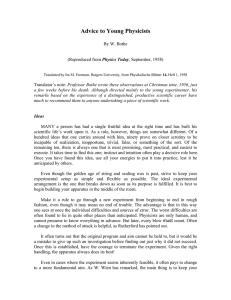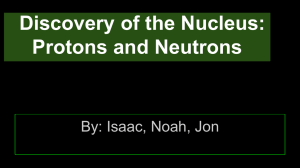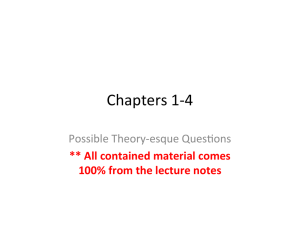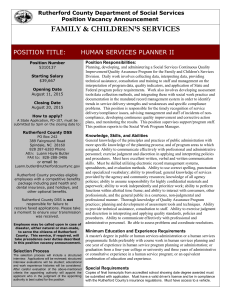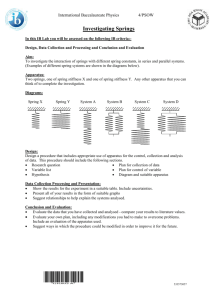Advice to Young Physicists
advertisement
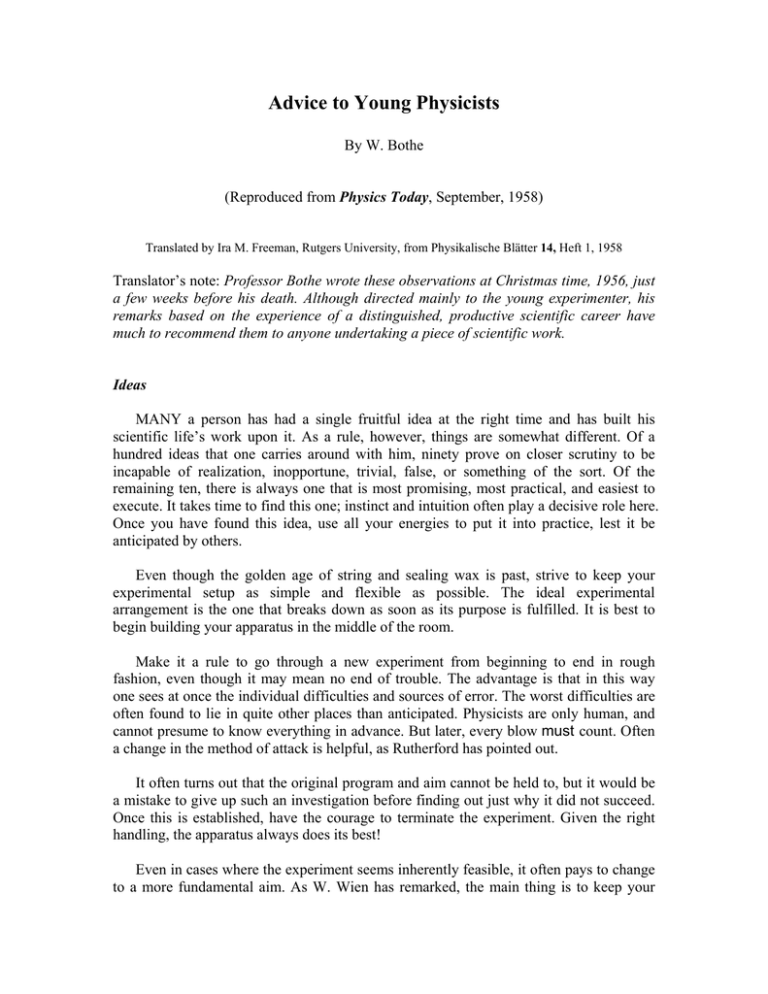
Advice to Young Physicists By W. Bothe (Reproduced from Physics Today, September, 1958) Translated by Ira M. Freeman, Rutgers University, from Physikalische Blätter 14, Heft 1, 1958 Translator’s note: Professor Bothe wrote these observations at Christmas time, 1956, just a few weeks before his death. Although directed mainly to the young experimenter, his remarks based on the experience of a distinguished, productive scientific career have much to recommend them to anyone undertaking a piece of scientific work. Ideas MANY a person has had a single fruitful idea at the right time and has built his scientific life’s work upon it. As a rule, however, things are somewhat different. Of a hundred ideas that one carries around with him, ninety prove on closer scrutiny to be incapable of realization, inopportune, trivial, false, or something of the sort. Of the remaining ten, there is always one that is most promising, most practical, and easiest to execute. It takes time to find this one; instinct and intuition often play a decisive role here. Once you have found this idea, use all your energies to put it into practice, lest it be anticipated by others. Even though the golden age of string and sealing wax is past, strive to keep your experimental setup as simple and flexible as possible. The ideal experimental arrangement is the one that breaks down as soon as its purpose is fulfilled. It is best to begin building your apparatus in the middle of the room. Make it a rule to go through a new experiment from beginning to end in rough fashion, even though it may mean no end of trouble. The advantage is that in this way one sees at once the individual difficulties and sources of error. The worst difficulties are often found to lie in quite other places than anticipated. Physicists are only human, and cannot presume to know everything in advance. But later, every blow must count. Often a change in the method of attack is helpful, as Rutherford has pointed out. It often turns out that the original program and aim cannot be held to, but it would be a mistake to give up such an investigation before finding out just why it did not succeed. Once this is established, have the courage to terminate the experiment. Given the right handling, the apparatus always does its best! Even in cases where the experiment seems inherently feasible, it often pays to change to a more fundamental aim. As W. Wien has remarked, the main thing is to keep your eyes open when you experiment. In order to be able to change course whenever it may seem desirable, the experimental setup must be simple, clear, and mobile. Subsidiary components, e.g. complicated circuitry, must not be allowed to become an end in themselves. Incidentally, one of the deadliest sins of the experimental physicist is to replace, covertly, damaged equipment in the storeroom without seeing to its repair. Economy of Scientific Work MAKE a daily schedule. Often, you will not be able to adhere to it; then it becomes your business to find out why. There is a grain of truth in W. Pauli's jest that in the PT Reichsanstalt [German Bureau of Standards] the cosmic radiation is turned off at quitting time each day. In the absence of a time schedule, there is always the danger that a piece of work will peter out with no tangible result. A timetable encourages concentration on a concrete goal and prevents one from getting lost in trivialities. A certain degree of laziness is proper for a physicist, but it must go hand in hand with mental flexibility. It has happened more than once that, starting from an irrational or even false formulation of a question, unexpected results have been attained. There is an old military rule to the effect that it is better to do something wrong than to do nothing. One should occasionally take a chance on even a "stupid" "experiment if it does not involve too great an expenditure of time. Acquaint yourself with literature, but do not have an abnormal fear of inadvertently repeating the work of another person. When the same ground is covered by two workers it is still not exactly the same thing. At least the emphasis is different. The Record Book HERE is a place where many sins are committed. Avoid in principle the keeping of records of measurements on loose or removable pages. Paste them into the book at once, or copy them in. Geiger told of an instance to the contrary that occurred when he was working with Rutherford. The master was counting scintillations. Geiger sat beside him and wanted to take down the results as Rutherford called them out, but found, unfortunately, that he did not have his record book at hand. When he timidly explained this to Rutherford the latter screamed at him: "Write on your cuffs!" In general, write everything down at once in your book--observational data on the right, computations, sketches of the setup, notes and results (framed in heavy lines) on the left. The pages should be numbered consecutively. The tearing out of pages and the throwing away of loose leaf pages filled with data also belong to the deadliest sins. When an experiment must be interrupted or discontinued it is imperative that the reason for this be marked on the left-hand page. All record books should be carefully put away, for even years later something that was originally thought to be wrong may attain significance. Writing the Paper BEGIN this as soon as possible, at the latest right after finishing the measurements. Under no circumstances wait until the apparatus has been dismantled. It is a mistake in organization, amounting to gross misconduct, to take a vacation after finishing your measurements, only to begin weeks or months later to write things up. There are good reasons for saying this: First, the measurements must still be fresh in your memory when you write, in case there are places in the record that are not clear. Second, one often notices only when writing the report that there may still be gaps in the argument--gaps that can often be closed by a short additional experiment if the apparatus is still available. With only slight exaggeration, one may say that the manuscript should be finished, to the point of merely inserting the final results, at the time the measurements are concluded. Concern over the style of your report always pays off. Simple, clear, short sentences should be the aim. The first thing to consider is the decisive formulation of your results and conclusions. Let the manuscript rest for a week or two and then look at it again with the eyes of a reader who is only half interested and somewhat unfriendly. Then it is time to do the final polishing. One last word: He who is not completely wrapped up in a piece of work had better leave it strictly alone. One must be able to admit that one's problems ripen in the subconscious even outside of working hours. It is a poor sign if things are otherwise. Walther Bothe, who died on February 8, 1957, was director of the Institute of Physics at the Max Planck Institute for Medical Research in Heidelberg. For his development of the coincidence counting method for studying cosmic rays he was named a co-winner (with Max Born) of the1954 Nobel Prize in physics.
